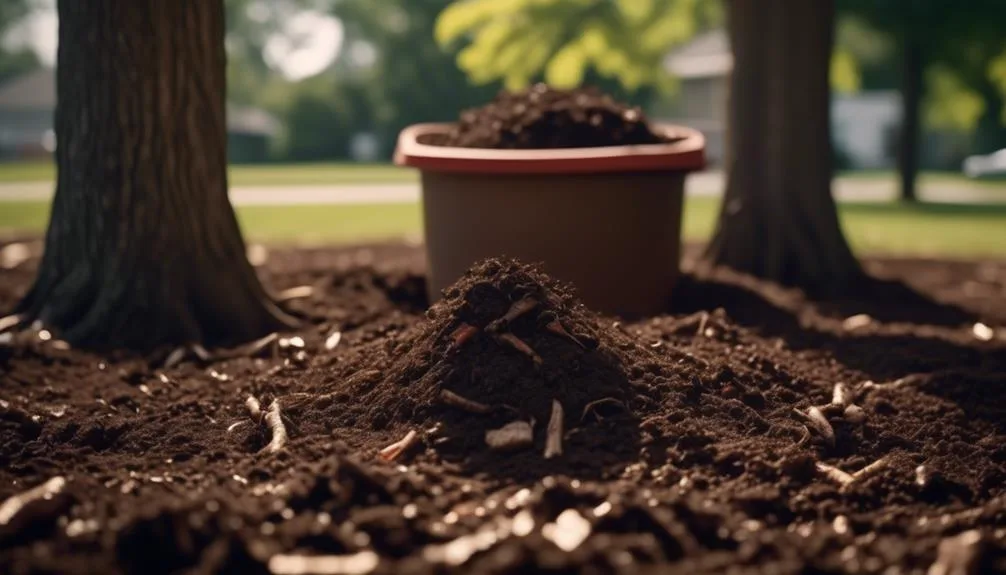Improving the soil for hickory trees is crucial for their optimal growth.
Methods like soil testing, adjusting pH levels, and adding organic matter can greatly enhance soil quality.
These techniques create a supportive environment for healthy hickory trees to thrive for years to come.
Soil Testing
Before planting hickory trees, it's essential to conduct a soil test to determine the specific nutrient and pH levels in the soil. Nutrient analysis is crucial as it ensures that the soil has the necessary elements to support the optimal growth of hickory trees. Understanding the soil composition is equally important as it influences the tree's ability to access nutrients and water.
By analyzing the soil composition, you can identify any deficiencies or imbalances that may hinder the trees' growth. The soil test results will guide you in making informed decisions about soil amendments and fertilization, ensuring that the hickory trees have the best possible environment for healthy development.
With this knowledge, you can proactively address any shortcomings in the soil, setting the stage for successful hickory tree cultivation.
Ph Adjustment
To ensure optimal growth for your hickory trees, understanding the soil's pH levels is crucial, as it directly impacts the trees' ability to access essential nutrients and water. Adjusting acidity is essential for creating a favorable environment for hickory trees.
Here are some steps to adjust the pH levels of your soil:
- Test the soil pH to determine the current acidity level.
- Calculate the amount of lime needed based on the test results.
- Apply the recommended amount of lime to the soil.
- Mix the lime thoroughly into the soil to ensure even distribution.
- Retest the soil pH after a few months to monitor the changes.
Organic Matter Addition
You can enhance the soil quality for your hickory trees by incorporating organic matter into the ground, promoting a healthier and more nourishing environment for their growth.
Adding organic matter, such as compost, offers numerous benefits. Composting enriches the soil by increasing its ability to retain moisture, which is crucial for hickory trees, especially during dry periods.
The decomposition of organic matter also promotes nutrient availability, ensuring that your hickory trees have access to essential elements for their growth and development. Furthermore, organic matter addition fosters a thriving ecosystem of beneficial microorganisms that aid in breaking down nutrients, making them more accessible to the hickory trees' root systems.
Mulching Techniques
Consider using mulching techniques to improve the soil quality around your hickory trees, enhancing their growth and overall health. Mulching offers several benefits such as nutrient retention and weed suppression, which are crucial for the well-being of your hickory trees.
- Nutrient Retention: Mulch helps to retain essential nutrients in the soil, providing a steady supply to the hickory trees.
- Weed Suppression: By covering the soil, mulch prevents weed growth, ensuring that the hickory trees have access to vital nutrients and water without competition.
When mulching around your hickory trees, ensure that the mulch layer is around 2-4 inches thick, and keep it a few inches away from the base of the tree to prevent moisture-related issues. Use organic materials like wood chips or shredded leaves for an effective and natural mulching solution.
Watering Practices
Improving the watering practices for your hickory trees is essential for their overall health and growth. Proper moisture management is crucial for hickory trees, and utilizing efficient irrigation methods is key.
When watering your hickory trees, focus on the root zone, which is where the majority of the tree's feeder roots are located. This will ensure that the water reaches the areas where it's most needed.
Consider the watering frequency, as hickory trees generally prefer deep, infrequent watering to encourage deep root growth. This helps the tree withstand periods of drought and promotes overall stability.
Conclusion
Ensuring optimal soil conditions for hickory trees is vital for their sustained health and growth. Through soil testing, pH adjustment, organic matter addition, proper mulching, and appropriate watering, a nurturing environment can be established for hickory trees to flourish.
These measures are instrumental in maintaining the long-term strength and vitality of hickory trees.

My interest in trees started when I first saw the giant sequoias in Yosemite.
I was a teenager then, and I remember thinking, “I need to learn more about this.”
That moment stuck with me.
A few years later, I went on to study forestry at Michigan Tech.
Since graduating, I’ve worked in a mix of hands-on tree care and community education.
I’ve spent over ten years helping people understand how to plant, maintain, and protect the trees in their neighborhoods.
I don’t see trees as just part of the landscape.
They are living things that make a real difference in our daily lives.
